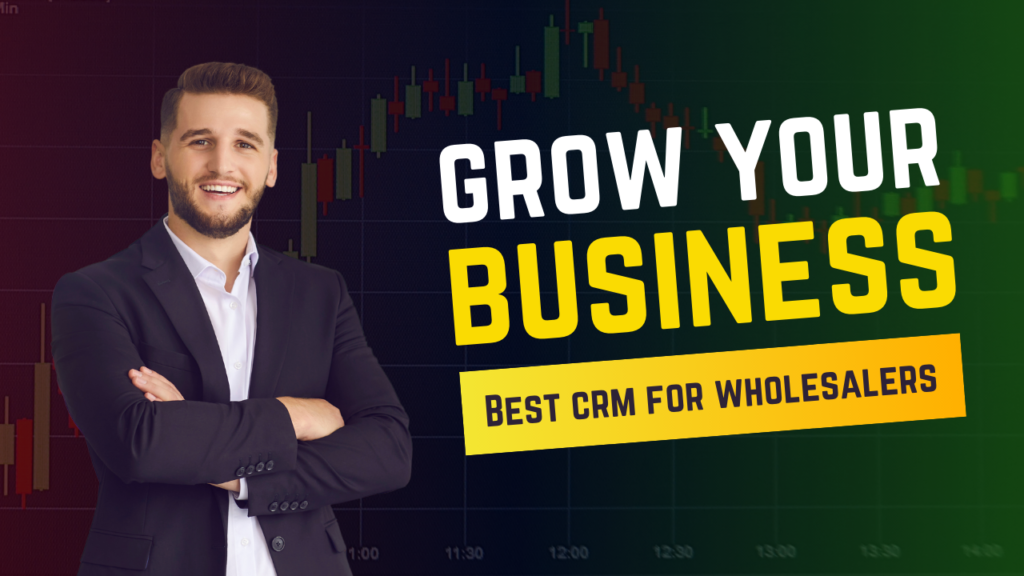Did you know that businesses using a CRM system experience a 29% increase in sales? In today’s competitive market, managing customer relationships effectively is not just an option—it’s a necessity. Whether you’re a small startup or an established enterprise, leveraging the right Customer Relationship Management (CRM) system can transform your business operations, enhance customer satisfaction, and drive substantial growth.
In this comprehensive guide, we’ll delve deep into the best CRM for wholesalers, comparing top solutions tailored to meet the unique demands of wholesale businesses. Selecting the right CRM is pivotal for achieving business success, influencing factors like customer retention, streamlined operations, and ultimately, your bottom line.
We’ll cover key features to look for in a CRM, provide an overview of the top CRM solutions available, and offer actionable recommendations to help you make an informed decision. By the end of this article, you’ll have a clear understanding of which CRM system aligns best with your business needs and how to implement it effectively.
What to Look for in a CRM for Your Business
Scalability
As your wholesale business grows, so does the complexity of managing customer relationships. A scalable CRM system is essential to accommodate increasing data volumes and user demands without compromising performance. Ensure that the CRM you choose can seamlessly expand its capabilities, whether it’s adding more users, integrating additional features, or handling larger datasets. Scalability ensures that your CRM remains a valuable asset, supporting your business at every stage of its growth.
Ease of Use
A CRM’s effectiveness is heavily dependent on how easily your team can adopt and utilize it. An intuitive interface and a straightforward onboarding process are critical, especially for small teams or those new to CRM systems. A user-friendly CRM reduces the learning curve, minimizes training time, and encourages widespread adoption across your organization. Look for systems that offer customizable dashboards, drag-and-drop functionalities, and comprehensive support resources to enhance usability.
Customization
Every wholesale business has unique workflows and requirements. The ability to customize your CRM ensures that it aligns perfectly with your specific processes. Whether it’s tailoring data fields, creating custom reports, or setting up personalized workflows, a flexible CRM allows you to adapt the system to fit your business seamlessly. Customizable features enable you to optimize your CRM for maximum efficiency, ensuring that it supports your operational needs effectively.
6 Best CRM Solutions for Wholesalers
Selecting the right CRM for wholesalers involves evaluating various options based on features, pricing, and suitability for your specific business needs. Here are six top CRM solutions that stand out in the market:
1. Pipedrive CRM
Pipedrive is a sales-focused customer relationship management (CRM) tool designed to help businesses manage leads and sales pipelines effectively. With its user-friendly interface and robust feature set, Pipedrive enables sales teams to automate processes, track communications, and enhance productivity. Its visual pipeline view makes it easy for users to see the status of deals and prioritize their sales efforts, making it particularly beneficial for wholesale businesses looking to optimize their sales processes.
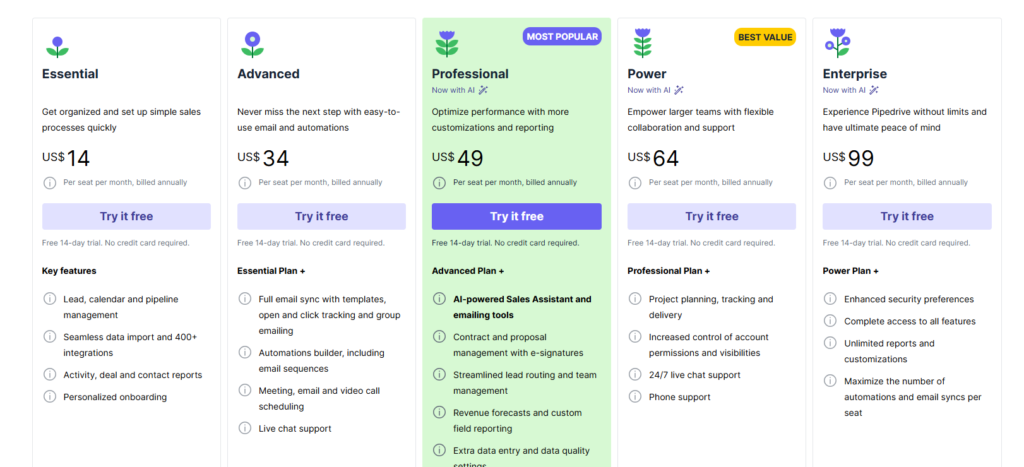
Key Features
- Visual Sales Pipeline: Offers a clear, visual representation of the sales process, allowing wholesale businesses to track deals at every stage.
- Activity and Goal Tracking: Enables users to set and monitor sales goals, ensuring that teams stay aligned with their targets.
- Automation and Workflow Management: Streamlines repetitive tasks, such as follow-up emails and lead assignment, which saves time and reduces the risk of human error.
- Email Integration: Syncs with popular email platforms, allowing for seamless communication and easy tracking of customer interactions.
- Mobile Accessibility: Provides mobile apps, enabling sales teams to manage their pipelines and access important information on-the-go.
- Reporting and Analytics: Offers detailed insights into sales performance, helping businesses make data-driven decisions.
- Customization Options: Allows users to customize fields and stages according to their specific sales processes, which is crucial for wholesalers with unique needs.
Pricing
- Essential Plan: $14/month per user
- Advanced Plan: $34/month per user
- Professional Plan: $49/month per user
- Power Plan: $64/month per user
- Enterprise Plan: $99/month per user
Pipedrive is particularly well-suited for wholesale businesses that prioritize sales efficiency and need a robust system for tracking leads and managing customer relationships. It is ideal for medium to large wholesalers who require detailed reporting and customizable workflows to cater to diverse product lines and customer segments. Its automation features are beneficial for teams looking to reduce administrative burdens and enhance sales performance.
2. Salesforce
Zoho CRM is a cost-effective, cloud-based CRM solution designed to help businesses of all sizes manage customer relationships, sales, and marketing in one unified platform. It’s known for its easy-to-use interface and extensive customization options.
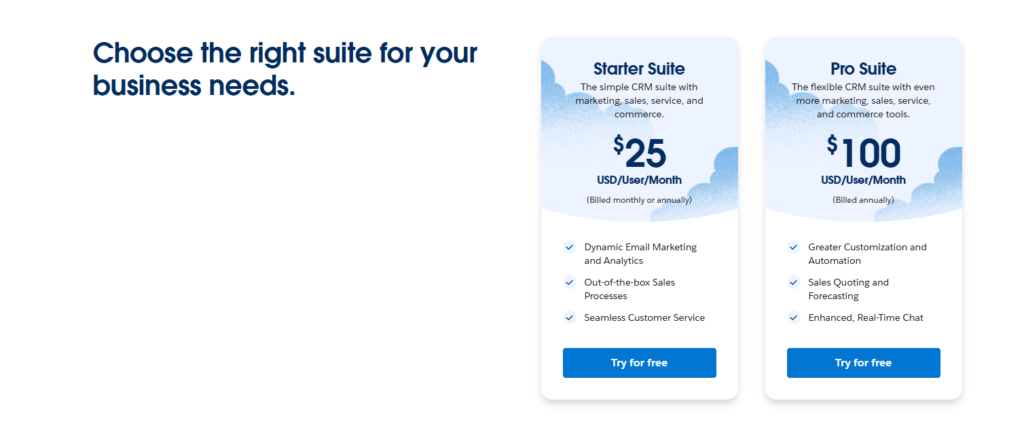
Key Features:
- Contact & Deal Management: Track customer interactions and manage wholesale deals efficiently, ensuring quick follow-ups and deal closures.
- Sales Automation: Automates repetitive tasks like sending emails, lead assignment, and nurturing, streamlining the wholesale order process.
- Inventory Management Integration: Connects with Zoho Inventory for seamless management of stock levels, order processing, and invoicing, crucial for wholesale operations.
- Customization & Workflow Automation: Tailor the CRM to suit your specific business process, ideal for managing large-scale wholesale orders and client databases.
- AI-powered Sales Assistant (Zia): Provides sales predictions, task automation, and performance insights, enabling smarter decision-making for large-scale wholesale distribution.
Pricing:
- Free Plan: For up to 3 users
- Standard: $14/user/month
- Professional: $23/user/month
- Enterprise: $40/user/month
- Ultimate: $52/user/month
Wholesale businesses with medium to large inventories looking for a flexible CRM that integrates with inventory management and offers automation for high-volume client handling. Ideal for businesses with a need for deep customization and advanced sales insights.
3. HubSpot CRM
HubSpot CRM is a popular, user-friendly platform that offers a range of tools for managing customer relationships, sales, marketing, and customer service. It’s ideal for businesses that want an easy-to-implement system with a strong focus on inbound marketing.
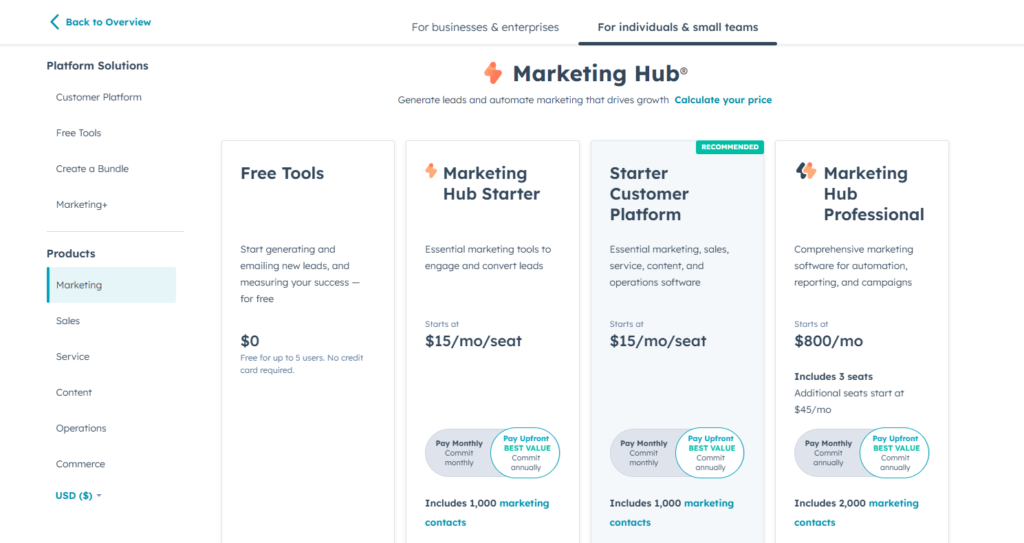
Key Features:
- Contact & Lead Management: Centralizes wholesale client data and tracks every interaction, making follow-ups and communication more efficient.
- Pipeline Management: Visualizes deals and sales pipelines, helping wholesale businesses track large orders and deal stages seamlessly.
- Email Tracking & Automation: Automates repetitive tasks like email outreach, follow-ups, and reminders, saving time on wholesale customer communication.
- Live Chat & Help Desk: Engage customers directly on your site, offering instant support and boosting customer satisfaction in wholesale dealings.
- Integration with Marketing Tools: Connects with HubSpot’s marketing suite for inbound marketing strategies, helping wholesale businesses attract and retain more clients.
Pricing:
- Free Plan: $0 for core features
- Starter: $15/month
- Professional: $800/month
- Enterprise: $3,600/month
Small to medium-sized wholesale businesses that want a CRM with strong marketing integration and scalable features. HubSpot’s free plan is great for startups, while larger wholesalers benefit from the Professional and Enterprise plans with more advanced sales automation and customer management capabilities.
4. Keap CRM
Keap is an all-in-one CRM platform that focuses on helping small businesses automate their sales and marketing efforts. It is particularly suited for businesses looking to streamline client management, marketing campaigns, and follow-ups.
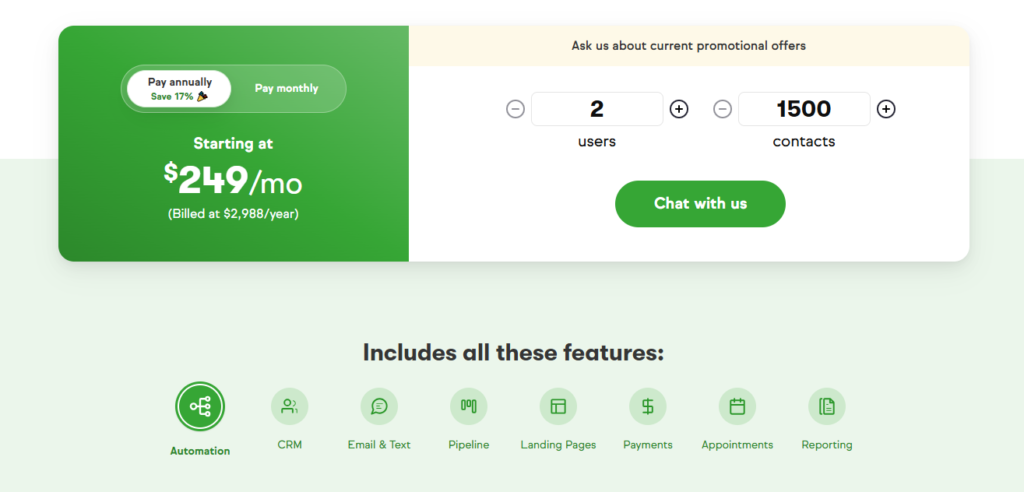
Key Features:
- Sales Pipeline Management: Tracks leads and deals for wholesale businesses, helping manage bulk orders and follow-up reminders effectively.
- Automation for Emails & Workflows: Automates repetitive tasks like email marketing, appointment scheduling, and invoicing, saving time for wholesale reps.
- Client Management & Segmentation: Organizes and segments wholesale clients based on behavior and needs, ensuring personalized communication and better service.
- Integrated Payments & Invoicing: Allows easy invoicing and payment collection, streamlining wholesale transactions.
- Lead Capture Forms: Enables capturing new wholesale leads from websites or landing pages, perfect for scaling operations.
Pricing:
- Pro Plan: $249/month for 1,500 contacts and 2 users
- Max Plan: Starts at $349/month for more advanced features and users.
Small to medium-sized wholesale businesses that need strong automation for lead management, client communication, and payment processes. Ideal for reps looking to reduce manual tasks and enhance efficiency in handling large volumes of wholesale clients and orders.
5. Monday.com CRM
Monday.com CRM is a versatile and user-friendly customer relationship management tool that is part of the broader Monday.com work operating system. Designed to enhance team collaboration and streamline workflows, Monday.com CRM provides businesses with a visual platform for managing customer relationships, tracking sales processes, and organizing tasks. Its flexibility allows wholesale businesses to customize workflows to fit their unique sales cycles and operational needs.
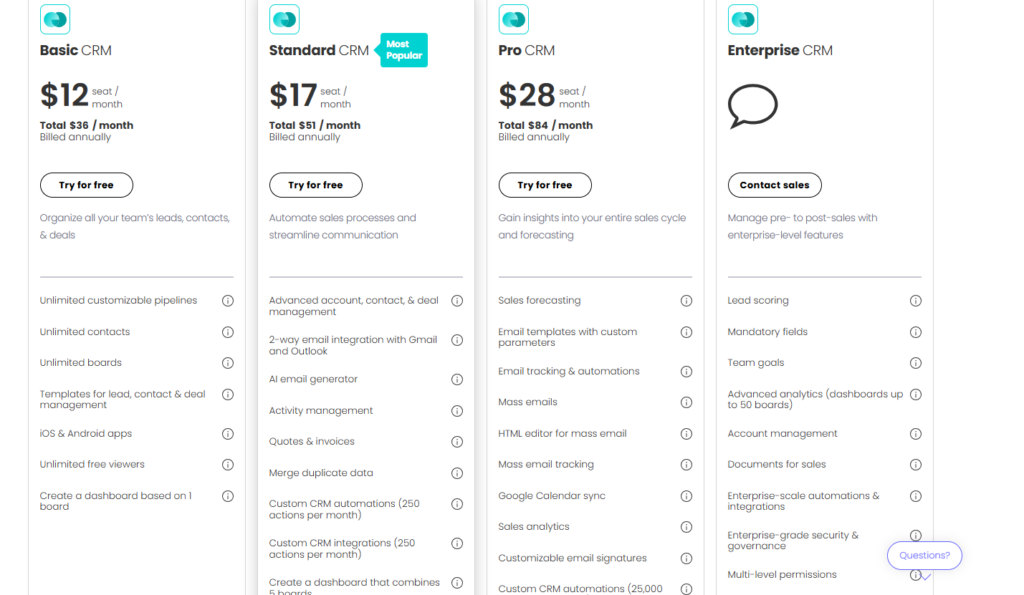
Key Features
- Visual Pipeline Management: Provides a customizable visual pipeline to track sales deals, making it easier for wholesale teams to manage customer interactions and sales stages.
- Automation and Integration: Automates repetitive tasks such as follow-ups and notifications, reducing manual work and increasing efficiency. Integrates with various tools like email, calendars, and other CRM applications.
- Customizable Dashboards: Offers intuitive dashboards that provide insights into sales performance, helping wholesale businesses monitor key metrics and make data-driven decisions.
- Collaboration Tools: Facilitates teamwork through features like comments, file sharing, and task assignments, enhancing communication among sales and support teams.
- Time Tracking: Enables teams to track time spent on tasks and projects, which is essential for understanding resource allocation and productivity.
- Mobile App: Provides access to CRM functionalities on mobile devices, allowing sales teams to stay connected and manage their tasks while on the go.
- Customer Support and Analytics: Offers customer support features and analytics tools to improve customer interactions and understand buying behaviors.
Pricing
- Individual Plan: Free for up to 2 users, includes basic features.
- Basic Plan: $8/month per user, includes essential features and a visual project management board.
- Standard Plan: $10/month per user, adds advanced features like timeline views and integrations.
- Pro Plan: $16/month per user, includes additional automation, advanced reporting, and time tracking.
- Enterprise Plan: Custom pricing for larger teams, includes advanced features, custom solutions, and priority support.
Monday.com CRM is best suited for small to medium-sized wholesale businesses that require a highly customizable and collaborative platform for managing customer relationships and sales processes. Its visual interface and automation features make it particularly beneficial for wholesalers looking to enhance team coordination, improve workflow efficiency, and gain better visibility into their sales pipeline. Businesses that value collaboration across departments will find Monday.com CRM especially advantageous, as it facilitates communication and task management among sales, marketing, and customer support teams.
6. Zoho CRM
Zoho CRM is a comprehensive customer relationship management platform designed to help businesses streamline their sales, marketing, and customer support processes. With its wide range of features and tools, Zoho CRM enables businesses to manage customer interactions effectively, automate workflows, and analyze performance metrics. Its flexibility and scalability make it suitable for various industries, including wholesale, where managing customer relationships and sales pipelines is critical.
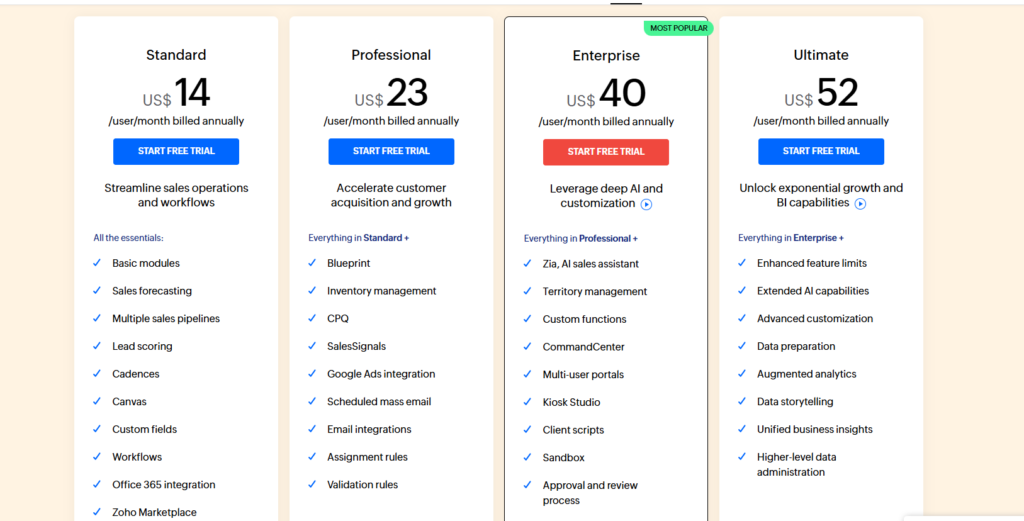
Key Features
- Lead and Contact Management: Allows wholesalers to manage and segment leads effectively, enabling targeted marketing and personalized communication.
- Sales Automation: Automates routine tasks like follow-ups and reminders, freeing up time for sales teams to focus on building relationships and closing deals.
- Workflow Automation: Customizable workflows streamline processes, ensuring that each step in the sales cycle is efficiently handled.
- Analytics and Reporting: Offers robust analytics tools to track sales performance and customer behavior, helping wholesalers make data-driven decisions.
- Multi-Channel Communication: Supports email, phone, social media, and live chat integration, allowing for seamless communication with customers.
- Mobile App: Provides access to CRM functionalities on mobile devices, enabling sales teams to manage leads and customer interactions while on the move.
- Customization Options: Highly customizable modules and fields to fit the unique needs of wholesale businesses, making it easy to tailor the CRM to specific processes.
Pricing
- Free Plan: Ideal for up to 3 users, includes basic features.
- Standard Plan: $14/month per user, includes advanced features like sales automation and reporting.
- Professional Plan: $23/month per user, adds inventory management and workflow automation.
- Enterprise Plan: $40/month per user, includes advanced analytics and customization options.
- Ultimate Plan: $52/month per user, provides enhanced support and additional features for large teams.
Zoho CRM is best suited for small to medium-sized wholesale businesses that require a flexible and scalable solution to manage their customer relationships. It is particularly beneficial for wholesalers looking for a cost-effective CRM that offers extensive customization options and automation features to streamline sales processes and improve customer engagement. Its multi-channel communication capabilities make it ideal for businesses that interact with customers through various platforms.
Which CRM is Best for Your Wholesale Business?
After evaluating the top CRM solutions based on scalability, ease of use, and customization, Salesforce Sales Cloud emerges as the best CRM for wholesalers. Its comprehensive feature set, extensive integration options, and robust support make it a versatile choice for businesses aiming to optimize their customer relationship management strategies.
However, the best choice ultimately depends on your specific business needs. For smaller wholesalers or those seeking cost-effective solutions, Zoho CRM and HubSpot CRM are excellent alternatives. On the other hand, larger enterprises with complex requirements may find Microsoft Dynamics 365 and SAP Sales Cloud more aligned with their operational demands.
Use Case Recommendations
- Small to Medium Wholesalers: Zoho CRM offers an affordable, user-friendly platform with essential features that support growth without overwhelming your team.
- Large Enterprises: Salesforce Sales Cloud provides a robust, scalable solution with advanced customization and integration capabilities, ideal for managing extensive customer databases.
- Tech-Savvy Businesses: HubSpot CRM excels with its seamless integration with other HubSpot tools, making it perfect for businesses already leveraging HubSpot’s marketing and sales platforms.
- Data-Driven Organizations: Microsoft Dynamics 365 is ideal for businesses that require advanced analytics and reporting features to drive informed decision-making.
Next Steps
Ready to enhance your wholesale business with the best CRM solution? Start by identifying your specific needs and exploring the CRM options discussed. Most providers offer free trials or demo sessions—take advantage of these to get hands-on experience before making a commitment. Scheduling a demo with your preferred CRM provider can provide deeper insights into how the system can be tailored to your business processes, ensuring a smooth transition and optimal implementation.
How to Choose a CRM: A Beginner’s Buying Guide for Wholesalers
Selecting the right CRM can seem daunting, especially if you’re new to the concept. Here’s a step-by-step guide to help you navigate the process and choose a CRM that aligns with your wholesale business needs.
Step 1: Identify Your Business Needs
Start by assessing your current processes and identifying areas that require improvement. Consider factors such as customer data management, sales tracking, communication channels, and reporting needs. Understanding your specific requirements will help you narrow down CRM options that offer the features you need.
Step 2: Evaluate Key Features
Look for CRMs that offer essential features tailored to wholesalers, such as inventory management, order tracking, bulk communication tools, and integration with other business systems like ERP or accounting software. Additionally, consider advanced features like automation, analytics, and mobile accessibility to enhance your operational efficiency.
Step 3: Consider Budget Constraints
CRMs come in various pricing tiers, from free versions with basic functionalities to premium plans with advanced features. Determine your budget and evaluate which CRM provides the best value within your financial constraints. Remember to consider long-term costs, including subscription fees, customization expenses, and potential add-ons.
Step 4: Assess Customization and Scalability
Ensure that the CRM you choose can be customized to fit your unique workflows and can scale as your business grows. A flexible CRM system allows you to adapt to changing business needs without requiring a complete overhaul of your CRM infrastructure.
Step 5: Check Integration Capabilities
Your CRM should seamlessly integrate with your existing tools and software, such as email marketing platforms, e-commerce systems, and accounting software. Effective integration ensures that data flows smoothly between systems, reducing manual data entry and minimizing errors.
Step 6: Evaluate Customer Support and Training
Reliable customer support is crucial, especially during the initial setup and onboarding phases. Look for CRMs that offer comprehensive support options, including live chat, phone support, and extensive knowledge bases. Additionally, consider the availability of training resources to help your team get up to speed quickly.
Step 7: Test with a Free Trial or Demo
Before making a final decision, take advantage of free trials or demo sessions offered by CRM providers. This hands-on experience allows you to assess the user interface, test key features, and evaluate how well the CRM fits with your business processes.
Conclusion
Selecting the best CRM for wholesalers is a critical decision that can significantly impact your business’s efficiency, customer satisfaction, and growth trajectory. By understanding your unique needs, evaluating key features, and considering factors like scalability and customization, you can choose a CRM system that not only meets your current requirements but also adapts to future demands.
Remember, the right CRM is more than just a tool—it’s a strategic asset that fosters stronger customer relationships, streamlines operations, and drives sales. Take the time to explore your options, leverage free trials, and consult with CRM experts to ensure you make an informed choice that aligns with your long-term business goals.
Final Thoughts
As you embark on the journey to enhance your customer relationship management, keep in mind the importance of aligning your CRM choice with your business objectives. Consider factors such as long-term scalability, integration capabilities, and the ability to customize the system to fit your workflows. A well-chosen CRM will not only support your current operations but also empower your business to adapt and thrive in an ever-evolving market landscape.
FAQs
1. Do I really need a CRM?
Absolutely. A CRM system centralizes customer data, streamlines communication, and enhances your ability to manage relationships effectively. For wholesalers, this means better order tracking, improved customer service, and increased sales efficiency.
2. How secure is my data in a CRM?
Reputable CRM providers implement robust security measures, including data encryption, regular backups, and compliance with industry standards like GDPR. Always choose a CRM that prioritizes data security to protect your sensitive business information.
3. Can a CRM integrate with my existing tools?
Yes, most modern CRMs offer integration capabilities with a wide range of tools, including email marketing platforms, e-commerce systems, and accounting software. This ensures seamless data flow and reduces the need for manual data entry.
4. What is the cost of implementing a CRM system?
The cost varies depending on the CRM provider, the number of users, and the features you require. CRMs typically offer tiered pricing plans, ranging from free versions with basic functionalities to premium plans with advanced features and support.
5. How long does it take to set up a CRM?
The setup time depends on the complexity of the CRM and the size of your business. For small businesses, setting up a CRM can take a few days, while larger enterprises may require several weeks to fully implement and customize the system.
6. Can a CRM help improve customer retention?
Yes, a CRM helps you track customer interactions, identify trends, and personalize your communication, all of which contribute to improved customer satisfaction and retention. By understanding your customers’ needs and behaviors, you can tailor your services to better meet their expectations.
7. What are the key features to look for in a CRM for wholesalers?
Essential features include inventory management, order tracking, bulk communication tools, integration capabilities, customizable workflows, and robust reporting and analytics. These features help wholesalers manage their operations efficiently and enhance customer relationships.
8. Is training required to use a CRM?
While many CRMs are designed to be user-friendly, some level of training is beneficial to maximize the system’s potential. Most CRM providers offer training resources, including tutorials, webinars, and customer support, to help your team get up to speed quickly.
9. Can a CRM scale with my business?
Yes, a scalable CRM can grow with your business, accommodating more users, handling larger data volumes, and integrating additional features as needed. Choosing a CRM with scalability ensures that it remains a valuable tool as your business expands.
10. What support options are available with CRMs?
Support options vary by provider but typically include live chat, phone support, email support, and comprehensive knowledge bases. Some providers also offer dedicated account managers and premium support plans for more personalized assistance.
I’m Palash Pramanik, an SEO and CRM expert with a deep passion for helping businesses thrive online. I specialize in driving higher search engine rankings and creating seamless customer relationship management strategies to enhance both visibility and engagement. Whether you need to boost your online presence, attract the right audience, or streamline your client interactions, I offer tailored solutions designed to meet your specific needs. My goal is to help you optimize your digital strategy, strengthen customer connections, and drive sustainable growth. Let’s work together to elevate your business to new heights!

